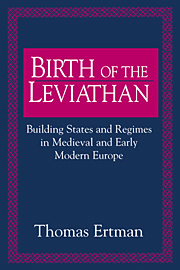Book contents
- Frontmatter
- Contents
- List of Tables
- Acknowledgments
- 1 INTRODUCTION
- 2 THE ORIGINS OF PATRIMONIAL ABSOLUTISM IN LATIN EUROPE
- 3 THE TRIUMPH OF PATRIMONIAL ABSOLUTISM AND THE FAILURE OF REFORM IN LATIN EUROPE, c. 1500–1789
- 4 BUREAUCRATIC CONSTITUTIONALISM IN BRITAIN
- 5 BUREAUCRATIC ABSOLUTISM IN GERMANY
- 6 THE TRIUMPH OF PATRIMONIAL CONSTITUTIONALISM IN HUNGARY AND POLAND AND ITS PREMATURE DEMISE IN SCANDINAVIA
- 7 CONCLUSION
- Bibliography
- Index
7 - CONCLUSION
Published online by Cambridge University Press: 12 March 2010
- Frontmatter
- Contents
- List of Tables
- Acknowledgments
- 1 INTRODUCTION
- 2 THE ORIGINS OF PATRIMONIAL ABSOLUTISM IN LATIN EUROPE
- 3 THE TRIUMPH OF PATRIMONIAL ABSOLUTISM AND THE FAILURE OF REFORM IN LATIN EUROPE, c. 1500–1789
- 4 BUREAUCRATIC CONSTITUTIONALISM IN BRITAIN
- 5 BUREAUCRATIC ABSOLUTISM IN GERMANY
- 6 THE TRIUMPH OF PATRIMONIAL CONSTITUTIONALISM IN HUNGARY AND POLAND AND ITS PREMATURE DEMISE IN SCANDINAVIA
- 7 CONCLUSION
- Bibliography
- Index
Summary
What lessons does the long and complex process of European statebuilding hold for the study of political development more generally? Before addressing this question, it may be useful to summarize this book's principal findings once again. From the 11th century onward, Europe was divided into a multiplicity of political units which remained locked in conflict with one another throughout the medieval and early modern period. In response to war and preparation for war, rulers sought to monopolize political power in order to gain exclusive control over foreign, military, and financial policy. At the same time, they attempted to construct ever larger and more specialized state apparatuses so as to guarantee order at home and batdefield success abroad. A dynamic, autonomous market economy furnished the resources necessary for such an expansion of military, administrative, and financial infrastructures.
Yet precisely because geomilitary competition and the resulting tendencies towards absolutism and the growth of the state were so ubiquitous, they cannot in themselves explain differences in the paths of development followed by the various European polities. Attempts to do so either through variations in the intensity of geomilitary competition and/or variations in socioeconomic structure have not proven successful. In this book, I have argued that a combination of three factors can account for such differences in a more convincing way.
First, the kind of political regime which a given state came to possess by the 18th century was determined by the ability of national representative assemblies to resist royal pressures for absolutism, which was in turn a function of the nature of local government.
- Type
- Chapter
- Information
- Birth of the LeviathanBuilding States and Regimes in Medieval and Early Modern Europe, pp. 317 - 324Publisher: Cambridge University PressPrint publication year: 1997



